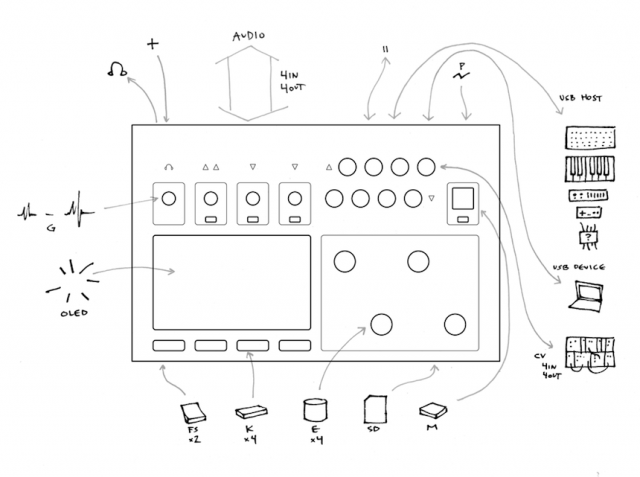Ezra Buchla (son of Donald Buchla) and Brian Crabtree (monome) have introduced Aleph – a Linux-based open source sound computer.
It can be a synthesizer, sampler, looper or drum machine – or, because it’s open source, anything that you can develop for it.
Key Features:
- soundcomputer – powerful audio processor, synthesizer, noise machine, rapidly modifiable instrument. a platform for experimental practice and organic discovery.
- attachments – connect grid controllers, modular synths, midi keys, stomp boxes, gamepads, hand-made circuits. for more direct control and uncommon pairings.
- topography – dynamically arrange control mappings with unprecedented flexibility. create software control sources such as modulators, logical operators, aleatoric processes, sequencers. all quickly storable and recallable.
- open source – designed for community engagement, a benefit for musicians and developers alike. an exceptional educational tool. the library of uses and possibilities can only grow.
Here’s what they have to say about it:
aleph is an adaptable soundcomputer where synthesis, drum machines, samplers, loopers, and various other possibilities can be implemented with creative mapping and numerous external control methods – attach via USB (grid controllers, knob boxes, MIDI keyboards, gamepads), CV (control voltage for modular synths, foot switches, etc) and computers.
simply put, aleph is a small audio input/output device with a screen, bank of buttons, and series of encoders/knobs. it has the ability to host and run a variety of programs created by both monome and the user based community surrounding. new applications will be developed, documented and shared over time. elaborate mappings can be created without writing code by way of an easy menu driven environment and a thorough preset system.
Here’s the official intro video for Aleph:
Here’s an overview of Aleph’s connectivity options:
The Aleph is being made by monome and is priced at $1400. See the monome site for details.



I can’t see standard Midi din in and out? that seems a real oversight to me as upon initial read this seemed IDEAL for a musician like me who does not use PC style computers in my performance, but if it cant take normal midi clock input its a non starter for me…hopefully I am wrong.
From the site:
where are the MIDI jacks?
USB MIDI is supported. for old MIDI gear, single-cable usb-to-midi converters are cheaply available these days.
At $1400 you would expect that to be part of the accessoires…
That’s the first thing I noticed, too. Everything else is pretty cool, though.
MIDI I/O on an open-source synthesizer? NAAAAHHHH… who’s gonna use that??
If the CV ports are just digital PWM GPIO, you might be able to reconfigure them as MIDI serial, & use one of those Expert Sleepers adapters/make one from a MIDI cable.
Using a CV for Midi naaaaaahh very important cuz very easy rs232 output.
very important cuz very easy rs232 output.
Aaaaaaaand I still have no idea what it does after watching the video.
What is this exactly?
VST host?
Overview is such generic and it tells nothing about device itself, jus a fairytales….. :-/
Thats because its a open source project for programer and other people who know that this station is a microcontroller with several interfaces. If you want it to be more go ahead
I already have a “sound computer.” It’s called a computer….
Also I can;t believe people are still paying for Vimeo. So slow, if it loads at all.
Erm…. average violin playing and some clicks… colour me non-plussed!
This looks like one of those boxes that would take an age to program and the results would always be alright, probably technically very good, but never satisfying from a musical point of view. Perhaps from a ‘look what I made it do’ perspective, and if that’s your thing great, but I’m not interested.
The idea behind open source is great, but the reality all too often fails to hit the mark. The people who work in the field are generally even worse than the ‘Apple Fan Boys’ for sheer arrogance and consistently delude themselves that Open Source has to be better than any proprietary system because, well, just because it’s Open Source. Logical tautology at it’s absolute worst!
Give me an intelligent, profitable, proprietary company, say like Ableton or DSI, any day over this!
And yes… academic as I will never buy one, but omission of Midi ports is just weird in this context!
(Excuse me while I get into my flame-proof suit – I’m getting good at this poking fun business)
I really resent a video trying to make out that their product is a magic box, and you just play and hit buttons like you know what you’re doing and the magic just happens.
We all know it isn’t true. That our musical lives are a nightmare of file management, learning new interfaces, finding new limitations to the last thing we paid $1500 for that still doesn’t do what we would really like it to,
and even if it’s open source and even if I’m a programmer, do I want to spend my free time coding to maybe mange to make this thing almost do what I want it to? Or do I just want to go play my violin?
It seems very expensive , There not enough individual outs to make it a credible sampler, nor enough knobs and sliders to make it a credible synth. I could but buy 3 mophos , and 3 mpx 8s, for less than this.
If you have more than sense , this is the next tenori.
I really like the idea of an Open Source and DIY synth/sampler/FX/general “mungler”, but this is not it. Overpriced and not as powerful as the “stuff” you could get for 1400$. Shame. It makes me sad because I believe the Open Source community could do much better.
Should have included MIDI I/O, definitely.
In principle, the idea of a versatile open-source audio box is a great one. If the design, features and price are right, it can evolve into an amazing gig-worthy box. This is too expensive, and lacks MIDI i/o. Not a great start.
While they use the phrase “Open Source” in the marketing blurb, this is actually not open source hardware. Only one of the included software and the usb interface are.
And at $1400, I would have expected more than 64MB of RAM which is only a few minutes of audio.
Also, you can already get a $25 Raspberry Pi which is actually entirely open source unlike the Aleph and build it into a synth, looper, drum machine…etc.
Aleph seems to be intended for hardcore open source instruments users and/or programmers. From the product sheet it doesn’t really say what Aleph does, but what it is able to do if you know how to tweak and program for it. And at that price it’s clear it’s not intended for those that may want to try their hands on Linux/Open Source music making. For those people there already is Raspberry costing $40.
What they COULD have done: build a box with 8 channels of audio i/o (for surround, monitor feed, etc.), headphone out, 2 ports each of MIDI I/Os, CV i/o, USB ports (and separate power in) cursor diamond, jog wheel, 4 faders each with two infinite knobs, color display. That’s it. Everything else can be controlled with external MIDI devices that folks can buy/make separately. If you charge $1400, it better be built like a tank. For that kind of scratch, I want to see them dropping it out of a window and driving a car over it.
I would develop for this and buy it outright if it had an XY pad on it (and better than the low def rubbish korg push out).$1400 is not unreasonable if you can develop on it; however knobs and pads are a bit limited
Their oversite on this particular video is that they tried to make their promo look like a major manufacturers promo. It was dumbed down and lacked any specifics. They should consider that anyone who would kick down that kind of dough would want to know some techy details. E.g. “With this box you have ample power to do x, y and z”